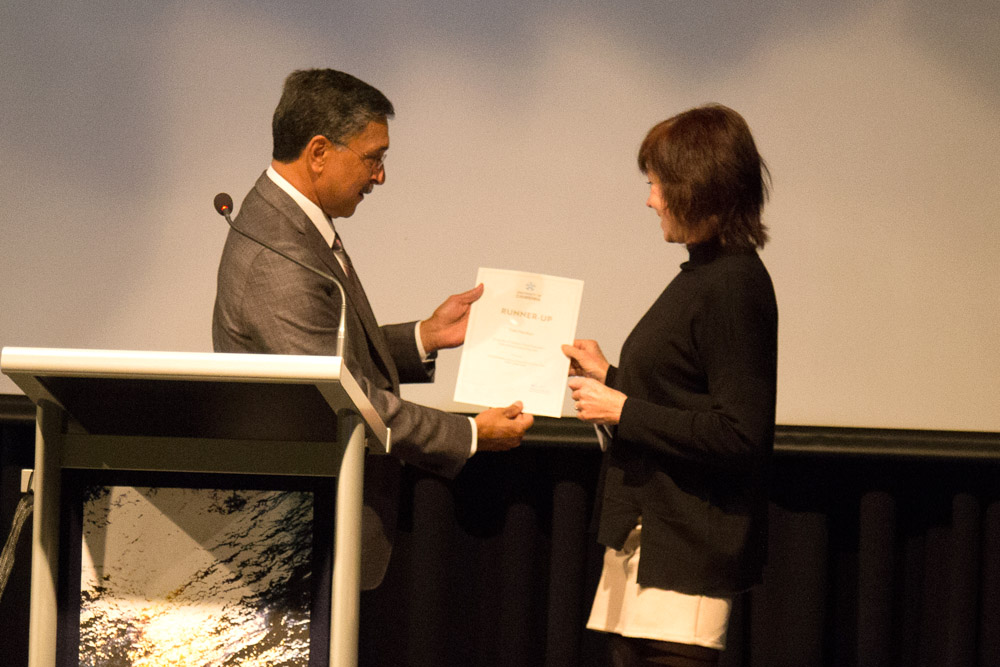Amanda Jones
10 October 2017: A poem about isolation, empathy and Van Gogh has won this year’s $15,000 University of Canberra Vice-Chancellor’s International Poetry Prize.
It is the fourth year the prize has been offered, with 670 poets submitting more than 1,000 poems from all over the world, including Greece, Germany, Romania, Scotland, Slovakia and Australia.
First prize was awarded to US-based Eric Berlin for Irises while Melbourne’s Debi Hamilton was named runner-up for Having Intended to Visit an Orange Grove, the Poem Finds Itself in a Supermarket.
Mr Berlin said he was “deeply grateful” to win the prize which was announced on campus on 21 September.
“This sort of thing basically never happens. Until somehow it does. I’ve been struggling to advance my writing as well as my research into the poetics of standup, hoping to reach a wider audience…and then, suddenly, this!”
He wrote Irises last September after having been granted a deals fellowship at an artist residency in the hills of upstate New York.
“I spent a few days straight composing haiku on index cards, then cobbled them together to form this piece,” he said.
“The poem explores the strangeness of the fact that loneliness is an experience we all share. It’s partly about the difference between solitude and isolation, and how one seems to shade into the other if we’re not kind to ourselves.
“This poem is secretly a renga, a traditional Japanese form composed by several poets taking turns. But since Irises is about the impossibility of being truly alone, I composed the different parts myself as if I were a group of selves.”
Mr Berlin’s work has won the Bradford on Avon Poetry Prize 2017, National Poetry Prize (UK) 2015 and The Ledge 2014 Poetry Prize. He currently teaches online for The Poetry School in the UK and is Assistant Editor at the online literary magazine The Cortland Review.
Ms Hamilton said she was excited and honoured to be named runner-up for the second time for her work Having Intended to Visit an Orange Grove, the Poem Finds Itself in a Supermarket. She won the same accolade in the first year of the prize in 2014 for What big plans you have.
“I remember exactly the day I wrote this poem - I was sitting in a cafe in Werribee on my lunch break, and pulled out my notebook and pen,” she said.
“I can’t say what the poem is about. It needs to speak for itself and if people get different things from it then it is doing its job! To my mind, the wonderful thing about poetry is the action of the reader’s mind in response to the poet’s words.”
“I hadn’t written a lot of poetry around that time, and I decided just to put my pen to the paper and see what came up. I don’t know why the memory of a hummingbird came up, but there it was! And I actually did go the supermarket afterwards (the poem was still unfinished at that point).”
The writer, poet and psychologist started writing poetry six years ago and was joint winner of the Newcastle Poetry Prize in 2014. She published her second poetry collection The Sly Night Creatures of Desire last year.
The University of Canberra Vice-Chancellor’s International Poetry Prize is facilitated by the University’s International Poetry Studies Institute, with writers asked to submit a previously unpublished poem, in English – translations were not eligible – up to 50 lines in length.
Vice-Chancellor Professor Deep Saini said he was delighted to see so many poets from around the world continue to enter the prize and thanked the entrants for their submissions.
“The University of Canberra is pleased to contribute to the literary community through this important prize. Poets remind us that there are so many ways of making meaning and that creative and complex uses of language have the power to nourish our imaginations.”
“This prize is a key way for the University to continue to further its network of national and international connections, as well as being part of the larger international literary conversations that are taking place worldwide,” Professor Saini said.
Other awards announced on the night included the Young Poets’ Awards, Health Poetry Prize and the inaugural University of Canberra Aboriginal and Torres Strait Islander Poetry Prize.



